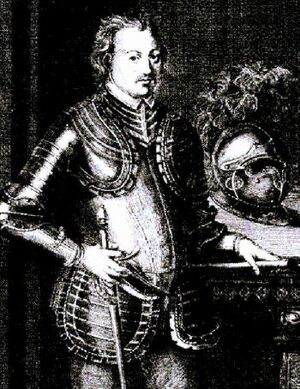Louis II, Elector of Brandenburg facts for kids
Quick facts for kids Louis VI |
|
|---|---|
| Duke of Upper Bavaria | |
 |
|
| Reign | 1347 - 1365 |
| Born | 7 May 1328 Rome, Italy |
| Died | 17 May 1365 Berlin, Germany |
| Spouse | Cunigunde of Poland Ingeborg of Mecklenburg |
| Issue | none |
| House | House of Wittelsbach |
| Father | Louis IV, Holy Roman Emperor |
| Mother | Margaret II, Countess of Hainaut |
Louis the Roman (German: Ludwig VI der Römer) was an important ruler in medieval Germany. He was born on May 7, 1328, and died on May 17, 1365. Louis was the oldest son of Louis IV the Bavarian, who was the Holy Roman Emperor. His mother was Margaret II. Louis was a member of the powerful House of Wittelsbach family.
He ruled as Duke of Upper Bavaria from 1347 to 1365, where he was known as Louis VI. He also became the Margrave of Brandenburg from 1351 to 1365, known there as Louis II. From 1356, he gained the special title of Prince-Elector of Brandenburg. This meant he had a vote in choosing the Holy Roman Emperor.
Contents
Life of Louis the Roman
Early Life and Family
Louis was born in Rome, Italy. His parents were visiting Rome for his father's coronation as Holy Roman Emperor. This is why he earned the nickname "the Roman."
When his father died in 1347, Louis became Duke of Bavaria. He shared this title with his five brothers. He also inherited the regions of Holland and Hainaut.
Giving Up Lands
In 1349, Louis gave up his rights to Holland and Hainaut. He gave them to his brothers, William I and Albert I. Louis hoped to become the King of Poland instead. He had married Cunigunde of Poland in 1345. She was the daughter of Casimir III, the King of Poland.
Later, Louis tried to get Holland and Hainaut back, but he was not successful. Because of this, he supported his mother in a conflict she had with his brother William.
Becoming Ruler of Brandenburg
In December 1351, Louis received Brandenburg from his older half-brother, Louis V of Bavaria. In return, Louis V got to rule Upper Bavaria all by himself.
Louis the Roman was less experienced than his half-brother. He faced a challenge from someone called the "False Waldemar." This person pretended to be the true ruler of Brandenburg. Many cities and even the Holy Roman Emperor Charles IV supported the False Waldemar. Eventually, Louis's family made peace with Emperor Charles IV.
Louis also had to give up claims to lands in Mecklenburg and Pomerania.
Gaining Electoral Power
A very important event happened in 1356. Emperor Charles IV issued a special law called the Golden Bull of 1356. This law officially made Louis the Prince-Elector of Brandenburg. This meant he had a permanent vote in choosing the Holy Roman Emperor.
In 1358, Louis was forgiven by the Pope for a past disagreement.
Later Life and Death
Louis's first wife, Cunigunde, died in 1357. After her death, Louis married Ingeborg of Mecklenburg-Schwerin. She was the daughter of Albert II, Duke of Mecklenburg. Louis did not have any children with either of his wives.
Because he had no children, his younger brother, Otto V, was set to inherit Brandenburg. In 1364, Louis and Otto made an agreement with Emperor Charles IV. They promised Brandenburg to Charles IV after their deaths. This was partly due to a disagreement with their brother Stephen II over who would inherit Bavaria.
Louis the Roman died in Berlin in 1365.
 | Bayard Rustin |
 | Jeannette Carter |
 | Jeremiah A. Brown |

